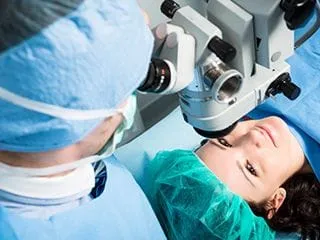
Eye Surgery Evolution
Advanced technology has made it possible to reshape eyes and restore vision to healthy levels for many people from all walks of life. Surgical techniques and tools have rapidly evolved over the past two decades to create procedures that are both safe and helpful.
Corrective surgeries for eyes now include everything from using lasers to reshape the cornea surface to inserting artificial lenses. These procedures correct how light entering the eye is processed – leading to much sharper vision in patients.
The state of the cornea is a determining factor in these surgeries. Thinner corneas with a high degree of myopia, for example, usually require a more invasive surgery to reshape the eye surface enough to improve vision.
Types of Eye Surgeries
Laser correction surgeries offer a snapshot of evolution in eye surgeries. Photorefractive Keratectomy (PRK) became the first successful surgery to change the shape of the cornea through removing tissue. The FDA approved PRK in 1995 and it is still widely used early in the 21st Century. With PRK, it only takes a few days for vision improvements to be realized.
LASIK followed on the heels of PRK. It involves cutting a thin flap in the outer covering of the eye to reshape the cornea. Unlike PRK, it only takes a few hours to gain sharper vision with LASIK surgery. There is some risk of suffering dry eye and other complications such as halos around bright lights until the flap fully heals. LASIK can be done with the aid of a mechanical cutting tool, using all lasers or incorporating wavefront technology that measures how light hits the eye.
Nearsighted patients are not alone in benefiting from surgeries. Farsightedness can be corrected through Conductive Keratoplasty (CK). It uses a small probe and low heat radio waves to create spots around the cornea periphery. CK steepens the cornea to give patients better near vision.
Some eye surgeries require implanting new artificial lenses to produce vision improvements. Implantable lenses similar to contact lenses can correct more severe levels of nearsightedness. These artificial lenses go permanently over the natural lens on the eye. Refractive Lens Exchange (RLE) takes it a step further and replaces the natural lens with an artificial lens of a different shape. RLE is done to correct extreme farsightedness.
Eye Surgery Considerations
Our eyes change as we age, so some corrective surgeries are not a good option for everyone. People under 18, for example, are not good candidates for laser eye surgeries because their eyes change rapidly as their bodies are growing.
Health also factors into eye surgeries. If you have diabetes or other medical conditions that impact eyesight, certain eye surgeries may pose serious risks.


